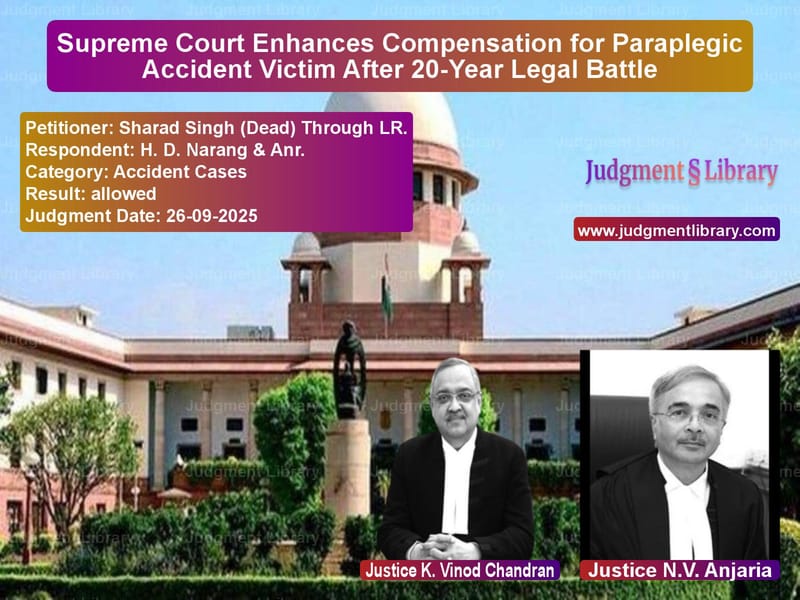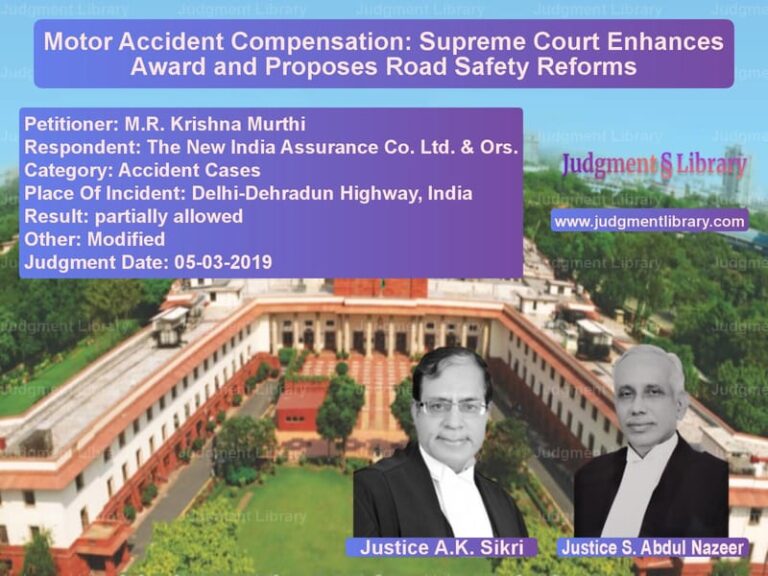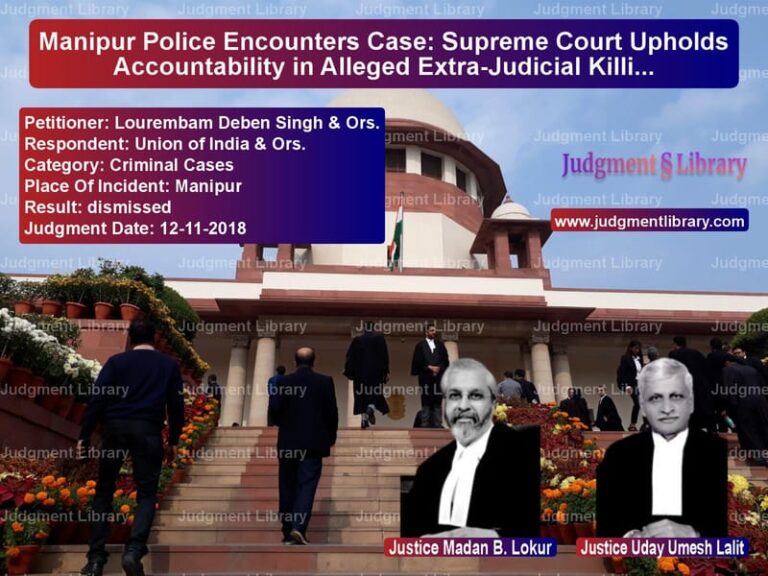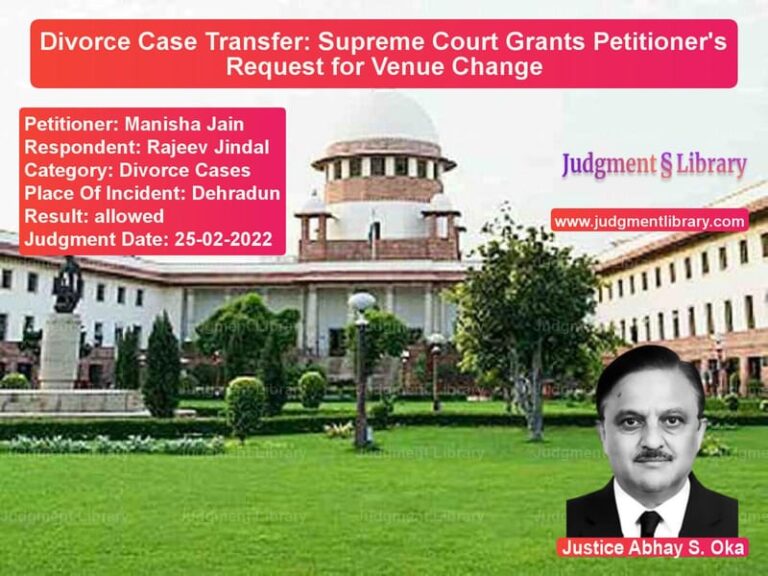Supreme Court Enhances Compensation for Paraplegic Accident Victim After 20-Year Legal Battle
In a compassionate judgment that recognizes the lifelong suffering of accident victims, the Supreme Court has significantly enhanced compensation for a young man who spent two decades as a paraplegic before his eventual death, ending a legal battle that spanned the entire duration of his disability. The judgment, delivered on September 26, 2025, addresses crucial questions about income assessment for students with bright prospects and medical expenses incurred over prolonged periods of disability.
The tragic case involved a 20-year-old student who was rendered completely immobile with paraplegia due to a fracture of C4-5 vertebrae sustained in a motor vehicle accident. The victim, who is now represented by his mother in the appeal, was travelling pillion on a bike when a car driven negligently and rashly hit the bike from behind, causing him to fall on the road and be run over by the car. The accident, which occurred in 2001, left the young man completely bedridden with 100% disability as certified by the All India Institute of Medical Sciences, and he remained in this condition until his death in 2021.
The Supreme Court bench comprising Justice K. Vinod Chandran and Justice N.V. Anjaria heard arguments from both sides regarding the quantum of compensation. The Insurance Company had raised objections about medical bills, arguing that “many of the bills were of the period before the disposal of the appeal by the High Court.” They also contended that “the victim who had his permanent residence in Delhi had produced medical bills from the hospitals at Goa and Bengaluru.” The company’s counsel expressed “the inability of the company to verify such bills and stressed on the aspect of no explanation having been offered for the treatments carried out in places other than the hometown.”
The Supreme Court, however, was “not impressed with the contention that there was no possibility of the company verifying the bills.” The Court firmly stated that “the respondent company having its offices all over India cannot raise such a contention.” The Court found the explanation provided by the appellant convincing – that “since the victim was paraplegic and was suffering from pneumonia, he had to be shifted to Goa, for reason of the adverse climatic conditions in Delhi, which would have aggravated his affliction.”
After verification, the Insurance Company admitted that medical bills amounting to Rs. 21 lakhs were genuine. The Court noted that “considering the fact that the High Court had modified the award and granted a further Rs.1 lakh, after deducting the same, we are of the opinion that an amount of Rs.20 lakhs is to be paid to the applicant for expenses incurred in sustaining the life of the victim, her son, for 20 years when he was completely bed ridden from 2001 till 2021 with 100% disability.”
The more significant aspect of the judgment concerned the computation of loss of income. The victim was a final year B.Com student who had also enrolled with the Institute of Chartered Accountants of India. The Tribunal had adopted an income of Rs. 3,339 per month based on minimum wages applicable to a workman, while the High Court increased it slightly to Rs. 3,352. The appellant’s senior counsel argued that “there was no rationale in adopting the minimum wages for determining the income of a bright student who was in the process of completing his graduation and proceeding to sit for the Chartered Accountants examinations.”
The Insurance Company initially argued that “the amounts determined as minimum wages, is as per the schedule in Delhi relatable to a graduate.” However, the Court was “not convinced that the minimum wages would be determined on the basis of the educational qualification alone without reference to the nature of work carried on.” After further verification, the company’s counsel submitted that the minimum wages adopted were those applicable to a skilled worker in 2001.
The Supreme Court took a progressive approach, recognizing the victim’s potential and aspirations. The Court observed that “We are not convinced that even that can be adopted for a graduate who was in the process of sitting for the Chartered Accountant examination which would have placed him in a good employment with immense prospects.” The judgment poignantly noted that “The aspirations of the young man were shattered by the accident which left him paraplegic and fighting for breath, which also prompted the parents to relocate to another part of the country.”
The Court determined that “even if he had not obtained the certificate as a Chartered Accountant, upon graduation, he could have been employed as an Accountant, who would have, on any reasonable estimate, received an amount of Rs.5,000/- as monthly income in the year 2001, if the minimum wages prescribed for a skilled worker was Rs.3,352/-“
Applying the principles established in the landmark Pranay Sethi case, the Court computed the loss of income with 40% future prospects. The calculation resulted in “Rs.15,12,000/- (Rs.5,000/- x 140% x 12 x 18). To this is to be added an amount of Rs.14 lakhs granted by the High Court under conventional heads and the medical expenses of Rs.11,22,356/- totalling to Rs.40,34,356/-“
The Supreme Court directed that “The total award carrying interest @ 9% per annum from the filing of the petition till realisation, as awarded by the Tribunal & the High Court and enhanced by us will be paid to the substituted appellant within a period of four months from today.” Additionally, the Insurance Company was made liable to pay Rs. 20 lakhs as future medical expenses incurred by the parents of the victim.
Read also: https://judgmentlibrary.com/supreme-court-enhances-compensation-for-100-disabled-accident-victim/
This judgment represents a significant step forward in compensation jurisprudence, particularly in recognizing the potential income of students with bright academic prospects. Rather than mechanically applying minimum wage standards, the Court considered the victim’s actual career trajectory and earning potential, acknowledging that bright students deserve compensation that reflects what they would likely have earned had their lives not been tragically altered.
The Court’s approach to medical expenses also demonstrates compassion and practical understanding of the realities faced by families caring for severely disabled individuals. The recognition that a paraplegic patient might need to relocate for better climate conditions, and that such relocation expenses are legitimate costs of care, shows the Court’s sensitivity to the practical challenges of disability management.
The judgment serves as an important precedent for future cases involving young accident victims with promising careers ahead of them. It establishes that compensation should not be limited to minimum wage calculations but should realistically assess what the victim would have likely earned based on their education, qualifications, and career aspirations.
For the family that cared for their completely paralyzed son for twenty years, this enhanced compensation, though coming after their son’s death, represents some measure of justice for the immense physical, emotional, and financial burden they carried for two decades. The Supreme Court’s judgment acknowledges that no amount of money can truly compensate for such a loss, but strives to ensure that the compensation awarded reflects the true magnitude of the loss suffered.
Petitioner Name: Sharad Singh (Dead) Through LR..Respondent Name: H. D. Narang & Anr..Judgment By: Justice K. Vinod Chandran, Justice N.V. Anjaria.Judgment Date: 26-09-2025.Result: allowed.
Don’t miss out on the full details! Download the complete judgment in PDF format below and gain valuable insights instantly!
Download Judgment: sharad-singh-(dead)-vs-h.-d.-narang-&-anr.-supreme-court-of-india-judgment-dated-26-09-2025.pdf
Directly Download Judgment: Directly download this Judgment
See all petitions in Road Accident Cases
See all petitions in Compensation Disputes
See all petitions in Motor Vehicle Act
See all petitions in Insurance Settlements
See all petitions in Third-Party Insurance
See all petitions in Judgment by K. Vinod Chandran
See all petitions in Judgment by N.V. Anjaria
See all petitions in allowed
See all petitions in supreme court of India judgments September 2025
See all petitions in 2025 judgments
See all posts in Accident Cases Category
See all allowed petitions in Accident Cases Category
See all Dismissed petitions in Accident Cases Category
See all partially allowed petitions in Accident Cases Category







